CSR
Green Aurangabad Mission
The Green Aurangabad Mission (GAM) is a flagship program under the Corporate Social Responsibility Policy of Grind Master Machines Pvt. Ltd. And I am grateful for the opportunity to play a small role in taking this movement forward.
While Grind Master Machines Pvt. Ltd. has been investing CSR funds into efforts for greening the Aurangabad district for over six years now, we launched the Green Aurangabad Mission in 2018. The focus of this mission is to implement innovative, region-appropriate methods and forge innovative partnerships to impact the environment sector positively.
Click on the button to download Green Aurangabad Mission Report.
Contributing to Society Grind Master CSR
Initiatives in Education, Waste Management and Preserving Environment forms a sizeable chunk of Grind Master’s community outreach programmes.
We contribute to the well-being of the people by implementing Dense Forest concepts, Providing assistance to the educational institutes across India reaching well beyond our business
CSR Vision 2020
Make continual long lasting impact in following areas :
- Resource Management – Waste to Resource
- Green Initiative – Mission Green Aurangabad
- Engineering Education
Dense Forest – Satara Area
Dense Forest – Satara
With a view to develop an urban forest in Aurangabad, a small pilot project of 2,400 square feet has been sponsored by Grind Master Machines Pvt. Ltd. on a private land at Satara, Aurangabad. An event for plantation of saplings by Grind Master employees was organised on 29th December,2016. CARPE (CRT^) has been monitoring and maintaining the forest. The Miyawaki Technique is a unique methodology developed by Akira Miyawaki who is a Japanese botanist and expert in plant ecology. Proven to work worldwide, irrespective of soil and climatic conditions,
this technique is based upon the concept of growing native species. CARPE conducted research into the technique and grew a dense urban forest with 780 plants of 43 different native species.
Benefits –
- The land identified for this plantation was a barren land where attempts to grow plants in the past have been made.
- Trees in urban areas help mitigate urban heat island effect and can cool the air by 2-8 degrees Celsius.
- Urban forests are excellent filters for urban pollutants
- A tree can absorb up to 150kg of CO2 per year, sequester carbon and consequently mitigate climate change.
- Trees help hold the soil together, conserve ground water, regulate water flow and improve water quality
Dense Forest – GM Waluj Facility
After the success of Satara Dense Forest, Grind Master Machines Pvt. Ltd in partnership with EcoSattva Environmental Solutions has planted a 11000 sqft dense forest at its industrial unit in Waluj MIDC. This is the major leap towards Green Aurangabad Mission. This forest boasts of 4700 saplings of 68 varieties and will contribute significantly to building the green lungs for this industrial area.
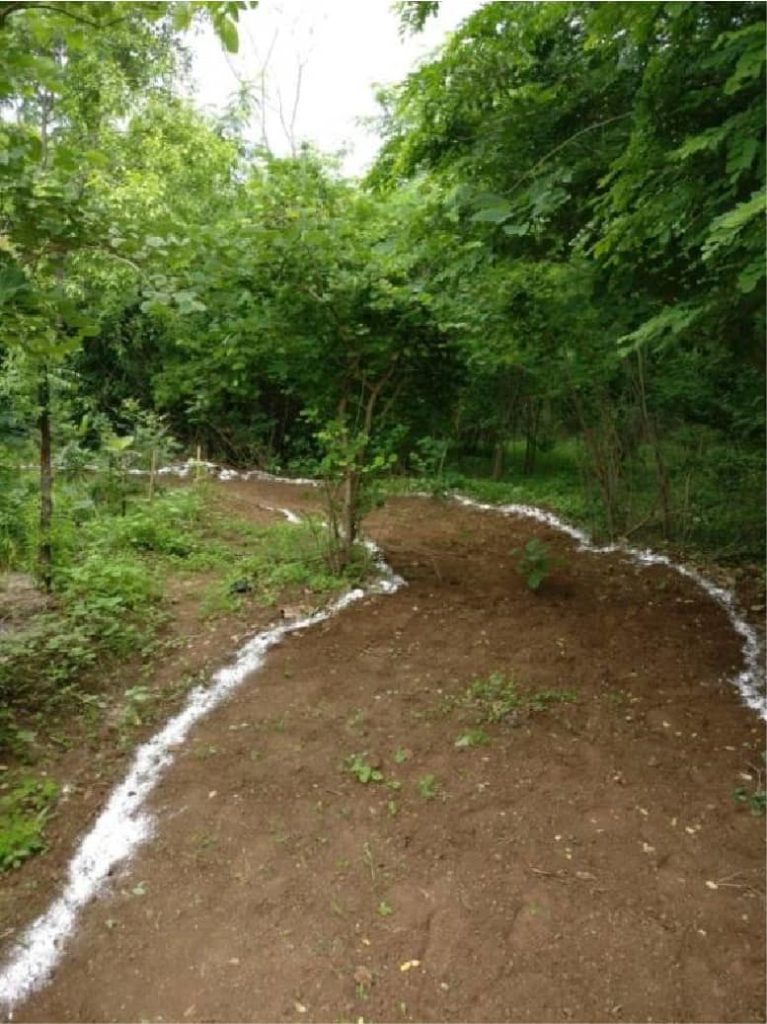
Step 1 Development
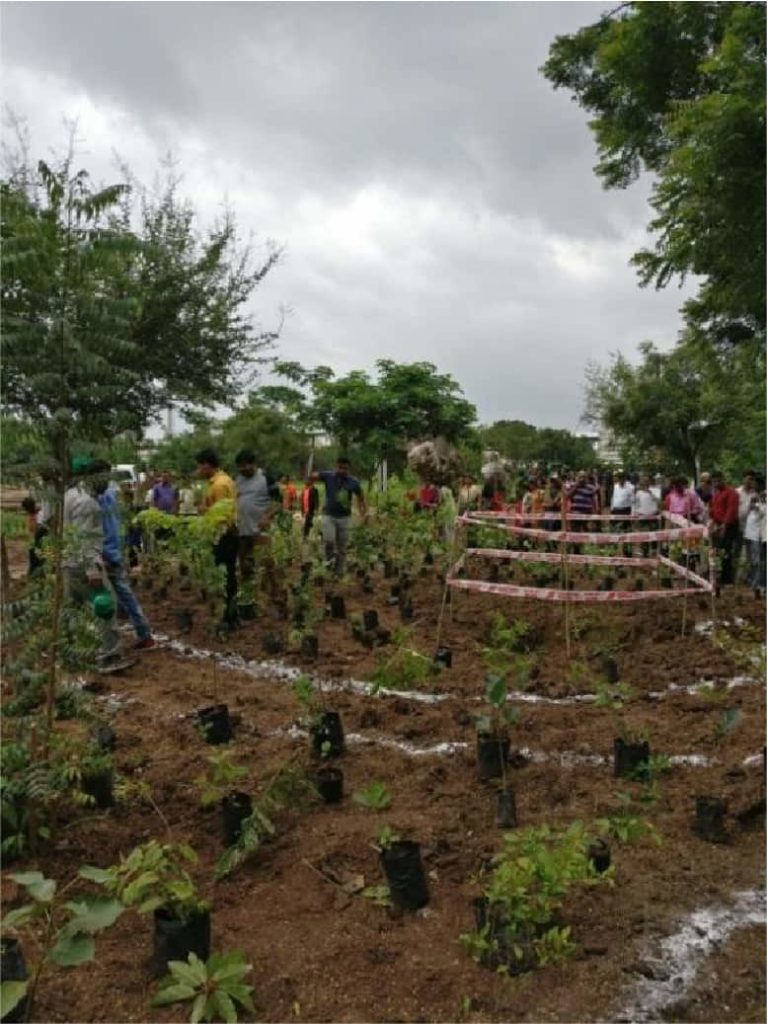
Step 2 Development
A dense forest, planted using the Miyawaki method, grows 10 times faster than trees planted conventionally. The Miyawaki Technique requires maintenance only for the first 3 years, after which the forest becomes self-sustaining. The Green_Maharashtra Mission mandates planting 50 crore saplings in the state over a span of three year. Through this dense forest Grind Master is making its contribution and hopes to inspire similar efforts from other members of the industry.
The project was executed in 2 steps –
Step 1 – December 2017
Area – 7000 Sqft
Saplings – 2600
Variety of Species – 68
Step 2 – July 2018
Area – 4000 Sqft
Saplings – 2100
Variety of Species – 68
Daulatabad Hillside Greening
- Grind Master started this project in 2014 as a part of their CSR initiative.
- Till 2016, only plantation was being done without any maintenance or monitoring.
- Oct 2016, This project was handed over to CARPE. CARPE conducted a plant census to establish survival rates, which was 33%.
- First, soil analysis done in Nov, 2016 at Maharashtra Rajya Draksha Bagaitdar Sangh, Pune and following actions taken as per requirements.
- Mulching of soil was done by experimenting with corn husk, biomass from garden waste and tender coconut shells. It was observed that coconut shells were most effective.
- Painting of water tanks and installation of dustbins with regular transportation and recycling of plastic waste was done.
- Dustbins were painted with the objective to promote cleanliness and avoid littering
- Regular monitoring and maintenance has ensured a high survival ratio.
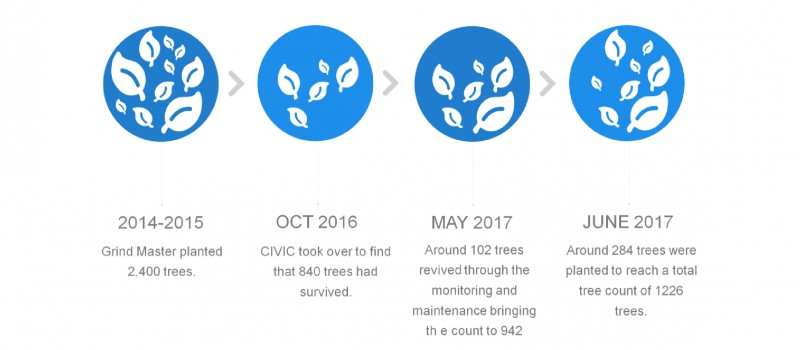
In March 2018, GM did Tri party agreement with CARPE Aurangabad and Forest Department, Government of Maharashtra. According to the agreement, 2 hectors land allocated to Grind Master and the GM will fund the project and CARPE will execute the project. We have planted and successfully survived 1800 trees as on date.
Tree Translocation
Nature is always giving us an examples on why we should we never give up. Grind Master is always ready to take a leap to preserve the nature.. About an year ago, during the widening of Paithan road project 4 monumental banyan trees were chopped down and left on the road to die. There were 8 such trees. 4 of them showed the signs of life.
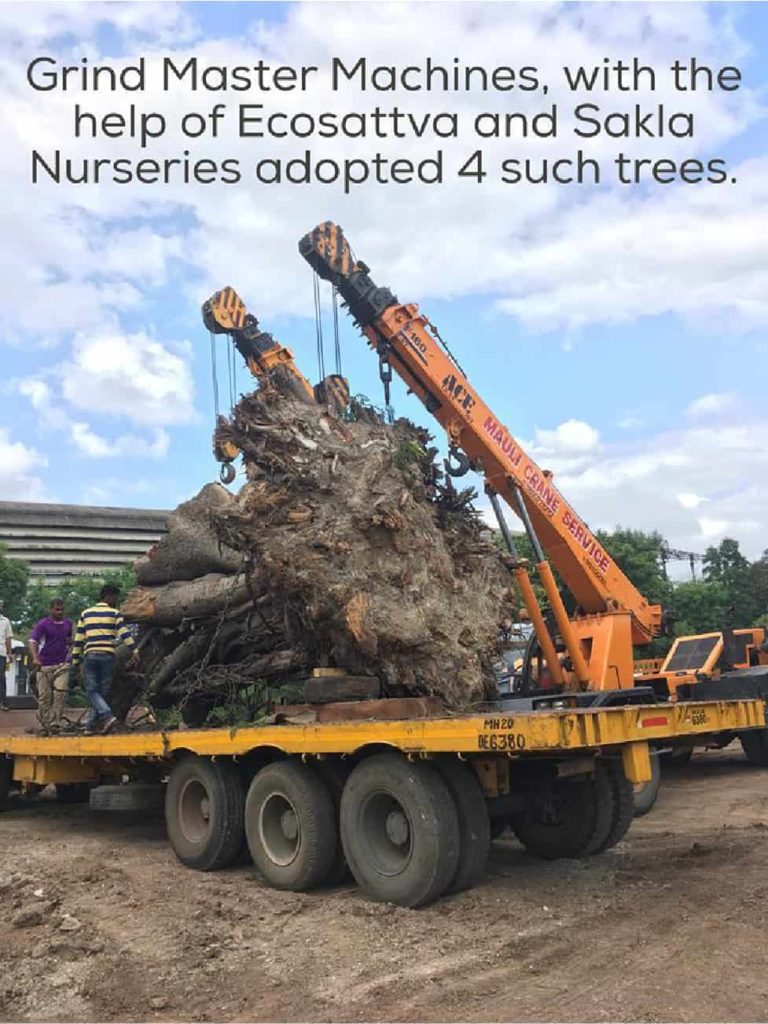
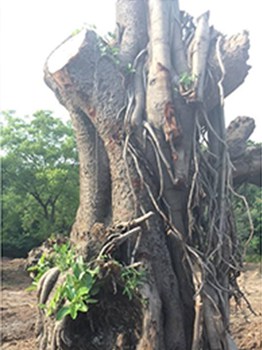
Those trees brought to GM Waluj plant and replanted there. The weight of each tree was between 20-25 tonnes. The trees are responding positively to this process and new shoots and new leaves are growing gradually.
Gol tekdi Urban Biodiversity Reserve
Aurangabad lies in the semi-arid zone of Maharashtra, floristically characterized by grasslands, thorn jungle and dry deciduous forests. These ecosystems support rich biodiversity ranging from large mammals such as leopards, wolves, foxes, deer; smaller animals such as hare, porcupines, and many different species of birds, butterflies, and reptiles. As cities grow in size, these habitats, often referred to as ‘wastelands’ or ‘barren’ are being converted to residential complexes, malls and industries. According to the United Nations (Ref), by 2050, 66% of the world’s population will be urban! As cities grow day by day, there is an increasing demand for urban green spaces to relax and rejuvenate. Urban parks therefore become the ‘green lungs’ of cities. Paradoxically, green spaces, if not developed on ecological principles, can be ‘environmentally unfriendly’. Many green spaces in Aurangabad have a vast lawn cover. Such a park will appear green only to the human eye, but do not find taking to bees, butterflies, birds and reptiles. Hence, the need of the hour is to restore green spaces keeping in mind the principles of sustainability and biodiversity friendliness. Due to development activities in grasslands and scrub habitats, these are increasingly getting threatened. To protect native biodiversity and to create awareness among the urban folk regarding important of these neglected habitats, Aurangabad needs a biodiversity reserve for thorn and scrub forest. A biodiversity survey was conducted on 18th-19th April ’17 by a team of biodiversity experts. A total of 45 plant species were recorded. Out of this, 18 were herbaceous plants, 8 were shrub species and 19 were tree species. 10 bird species were recorded. Indirect signs of hare were seen, 1 reptile species, and 5 insect species were observed.
ECO STP Plant at GM Waluj facility
Sewage Treatment Plant (STP) at Grind Master Waluj has started with an aim to decrease water consumption by using recycled water for gardening. Nature has robust technology to treat waste water. In this treatment plant, we created an ecological system which speeds up natural treatment process by using enzymes, plants, microorganisms and sunlight. It has zero power consumption and has no maintenance costs. Eco STP is a sustainable solution in real terms of sustainability which has positive environmental impact. Sewage treatment plant at Grind Master Waluj has highest capacity of 10kld. It has six units – Inlet, three for hydraulic retention, Planted Gravel Filter (PGF) and Outlet. Waste water collected in a septic tank is pumped into the inlet. Design of our inlet chambers are in such a way that sludge is deposited underneath and water is flown into the net chamber. Plant enzymes are added for catalysing the biochemical reaction of microorganisms acting up on degrading sewage. The design of tanks is in zigzag manner so that water takes time to move from one tank to other. PGF has stone bed consisting of different grades of stones. Water is slowly passed through PGF because of stones. As water moves slowly, there is enough of time for microorganisms to do their work of eating up sewage. Plants provide a sustainable ecosystem for microorganisms to form colonies on the roots. Outlet has water which has low pH and less dissolved solids. Treated water is collected into a pond for vegetation.
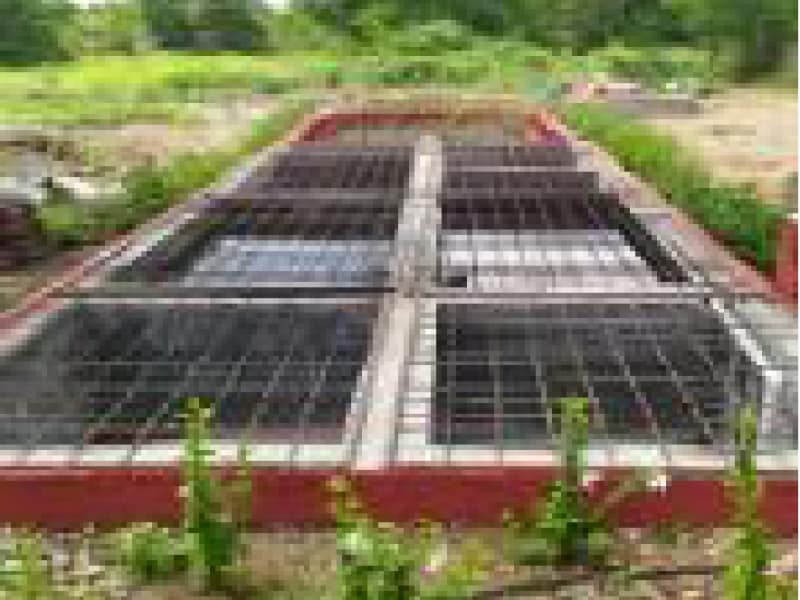
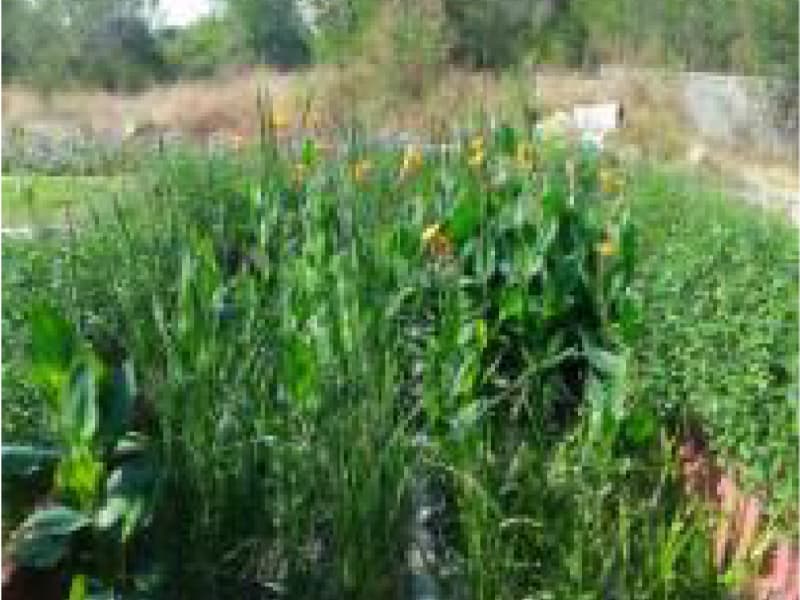
Adoption Traffic of Island
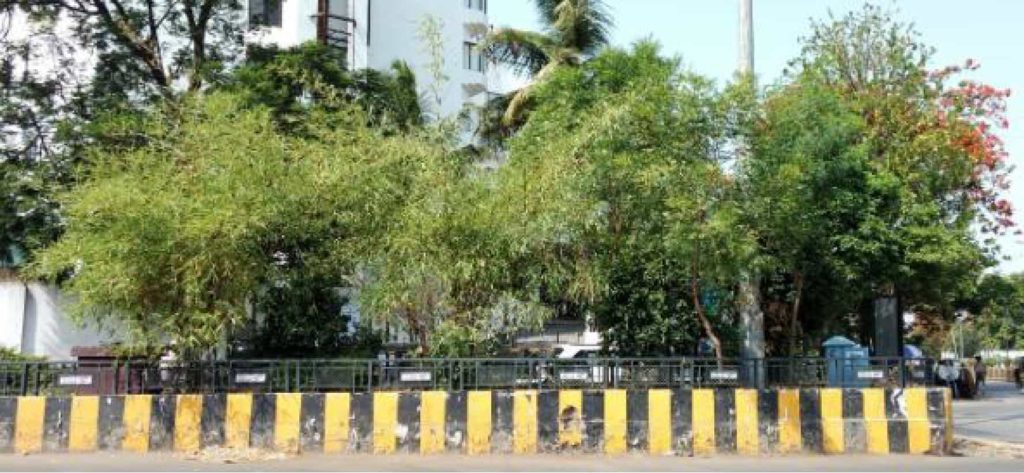
- Grind Master has constructed and planted green traffic islands with the Aurangabad Municipal Corporation through building partnerships for the Green Aurangabad Mission. Grind Master has adopted 3 traffic islands for 5 years in Aurangabad under their CSR activities. This is a Tripartite Agreement between Aurangabad Municipal Corporation, Grind Master and CRT.
Native Forest Species Seed Bank
Now a days many of our native forest species are vanishing rapidly. Such plants are having high medical contents, hence the GM is in collaboration with CARPE team collected the seeds of such plants by visiting Gautala Forest under guidance from Prof Vijay Pardeshi. Some of the rare seeds which we have found are Dolichandrone falcata (Medhsinghi), Terminalia elliptica (Aain), Madhuka indica (Moh), Boswellia serrata (Salai), Mitragyna parvifolia (Kalamb), Ehretia laevis (Ajaan). This was the pilot project. The seed bank is in the growing stage and will be available in next 3-4 months.
Tree Census
A tree census is the procedure of systematically recording information about the tree diversities in an area to obtain details of things as tree count, species diversity and distribution. Tree census is helpful to understand exact count of trees with species and other related information. Most of the tree species encountered were identified on field on the basis of their morphological characters like Bark shape, texture, and colour, Leaves- shape, size, texture, colour, arrangement, flower and fruit colour, shape, size, internal morphology like odour and arrangement of reproductive features. Morphological characteristics were used to identify the Tree species at the species level.
Education Sector
- Sponsoring MIT, Aurangabad BAJA Team – 2017
- Sponsoring Deogiri Institute of Engineering, Aurangabad EBAJA Team – 2017
- Sponsoring Government Engineering College, Aurangabad BAJA Team – 2017
- Sponsoring Government Engineering College, Aurangabad Robocon Team – 2017
- Sponsoring MIT, Aurangabad Robocon Team – 2017
- Prakriti Research Fellowship for Research in Ecology
- Teacher Training Pilot
- Education School Infrastructure Survey This survey was conducted in partnership with Grind master Machines, Aurangabad Municipal Corporation and CARPE team. The motto behind this is to assess the on-ground infrastructure of municipal schools in Aurangabad.
All functional AMC schools in Aurangabad city were visited and surveyed.
The key issues are :
- Lack of maintenance of existing structures
- Unavailability of water connection
- Lack of security resulting in use of school premises for drinking/ smoking during evening hours and frequent theft
- Lack of science and computer labs
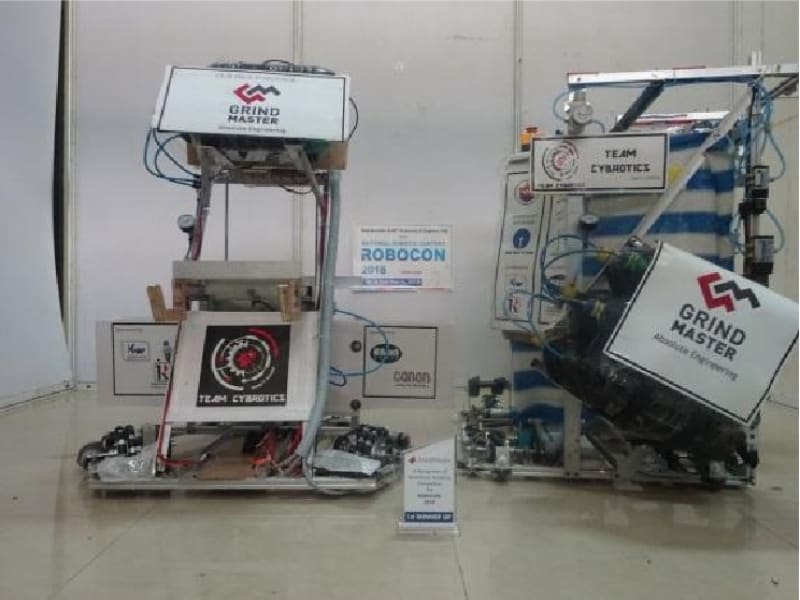
Robot by GEC Aurangabad
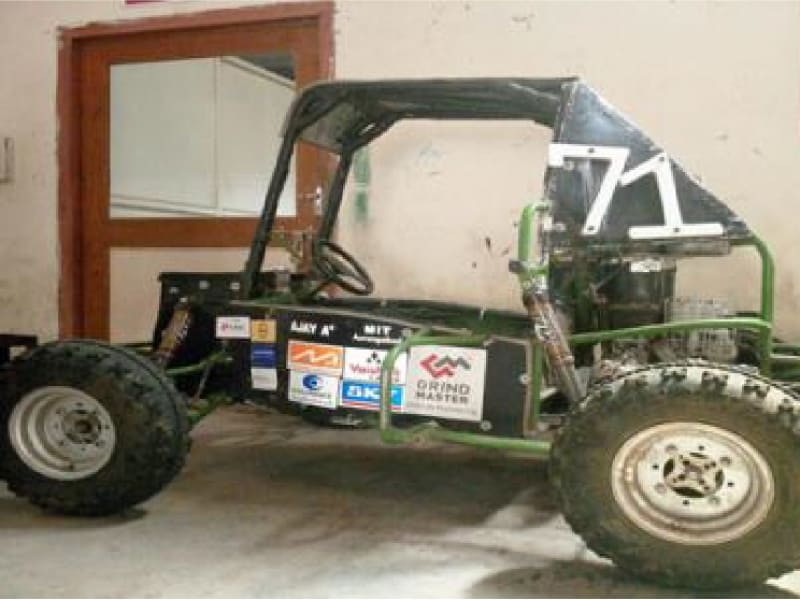
Car made by MIT BAJA Team
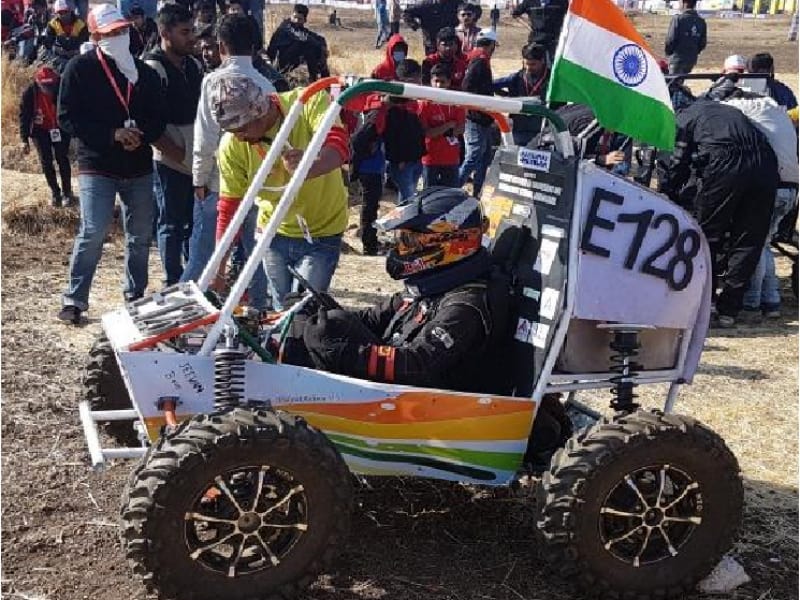
Car made by Deogiri College E-BAJA Team
Other Activities
- Sponsoring Ms Manisha Waghmare for Everest Trekking
- Nirmalya Daan The main objective of this project was Minimizing the impact of Ganesh Visarjan on Aurangabad’s water bodies by ensuring that only idols are immersed and all other organic and inorganic materials are kept out of the water bodies. GM in collaboration with CRT team Aurangabad took initiative and collected 80 tons of garbage from Ganapati Visarjan. We used this garbage for making compost fertilizers. The impact of the project was really good.This year also we are planning to do the same.
- Donation to Utkarsha Apang Parikshan Sanstha
- Donation to Navakshitij, an NGO takes care of Special Children.
- Water Arrangement for Thirsty Birds during this summer.


